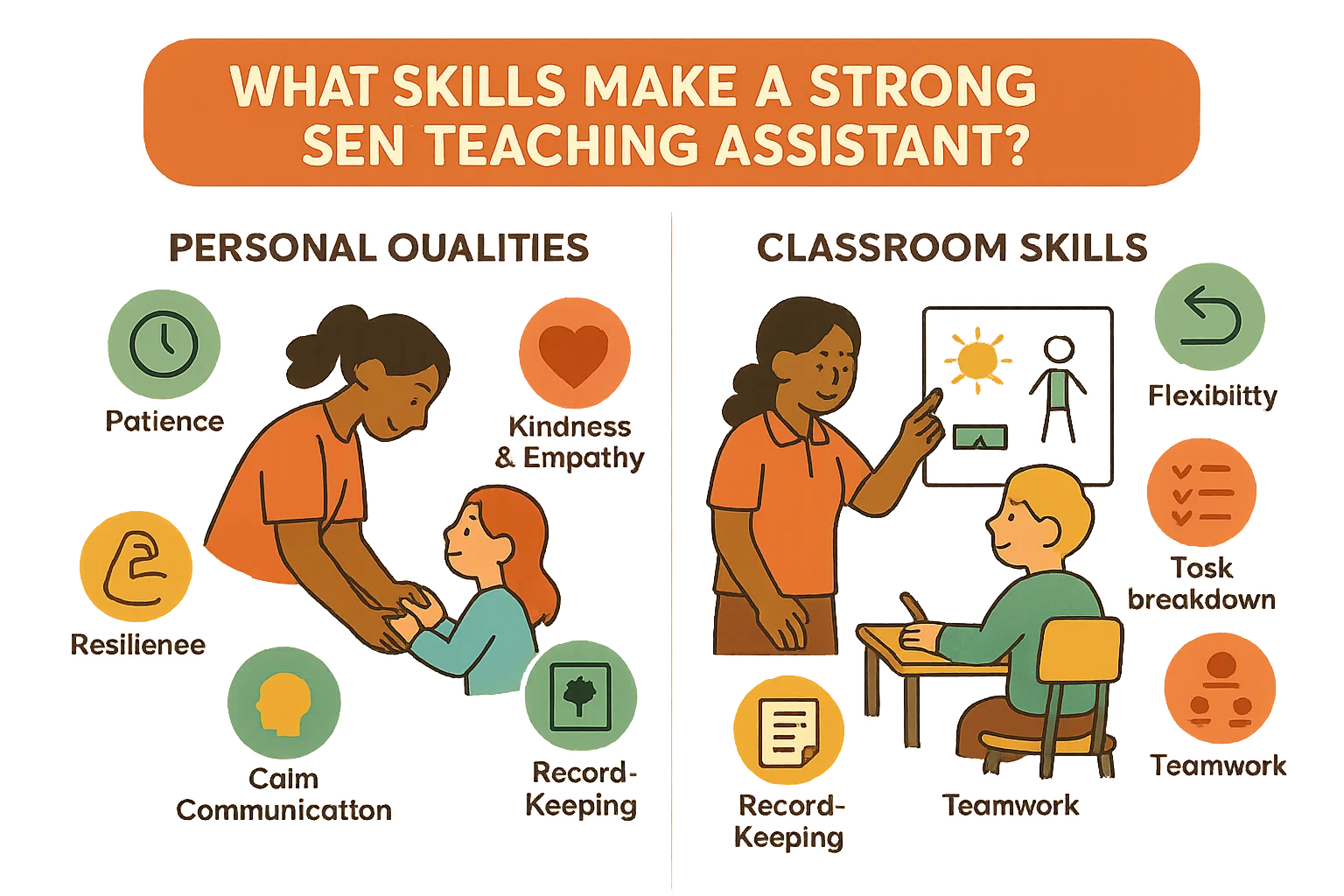No products in the cart.
Helping children with special needs learn and grow is a very kind and meaningful job. If you’re asking, “how do I become a teaching assistant with an SEN focus?”, don’t worry — it’s easier than it sounds. First, learn the basic skills of classroom support. Next, get some real experience in a school. Then, take SEN training to understand how to help children with different needs. Step by step, you’ll be ready to apply for SEN teaching assistant jobs and make a real difference.
Most schools ask for GCSE or Functional Skills in English and Maths. You also need an enhanced DBS check and a caring attitude. Most importantly, you must always think about children’s safety first. With the right training and love for learning, you can help every child do their best — and feel proud every day.
What Is an SEN Teaching Assistant?
An SEN Teaching Assistant helps children with special educational needs learn and feel included in class. They support pupils with learning, communication, and behaviour. Working closely with the SENCO and teachers, they use clear routines, visual aids, and calm guidance. Their goal is simple — to help every child feel safe, confident, and ready to learn every day.
How the Role Differs from a General TA
A general TA helps the whole class. An SEN TA gives more one-to-one support to children who need extra help. You may spend more time guiding one pupil or a small group. You also learn more about special learning methods and how to manage emotions or behaviour.
Key Focus Areas
As an SEN Teaching Assistant, you may support pupils with:
- Autism
- ADHD
- Dyslexia or dyscalculia
- Speech and language needs
- Sensory processing differences
- Physical or medical needs (and manual handling if trained)
Each child is different, so you’ll learn something new every day. Your care and support can make a big difference in their lives.
How Do I Become a Teaching Assistant With SEN Specialism?

If you want to become a teaching assistant with an SEN focus, that’s a great goal! The good news is — it’s not too hard to start.
Baseline Entry
- There is no single national licence for TAs.
- Most schools ask for GCSE or Functional Skills in English and Maths.
- These show you can read, write, and use numbers well.
Core TA Qualifications
- Start with a Level 2 Supporting Teaching and Learning course. It’s ideal for beginners and helps you learn the basics of the classroom.
- Move on to Level 3 Supporting Teaching and Learning. It gives you more skills and lets you work more on your own.
SEN Add-Ons That Stand Out
You can take short courses to learn about special needs. These help you understand pupils better and support them with care.
- Autism Diploma
- ADHD Awareness
- Cognitive Behavioural Therapy
- Communication and Visual Tools (like PECS or Makaton)
- Team-Teach or Positive Handling (if needed in your school)
Each course adds to your skills and confidence. Step by step, you’ll be ready to help children with different needs and make a real difference every day.
How Can Volunteering Help You Get Started in SEN Support?
Volunteering is one of the best ways to start your journey in SEN support. Even a few hours a week can teach you so much about how schools work and how children learn. You’ll get real experience, meet amazing staff, and see how small actions can make a big difference.
Why Schools Value SEN Experience
- Even short volunteering, like a half-day visit or weekly support, shows great commitment.
- It proves you can follow classroom routines and use calm, clear prompts.
- You also learn how to stay patient and kind when a child feels upset or struggles to focus.
- Schools love seeing people who can stay calm and caring during busy or challenging moments.
Turning Time Into Evidence
- Keep a simple log of your hours. Write down:
- the date,
- the place or setting,
- the strategies you used, and
- what went well or what you learned.
- Ask for two references from teachers or staff you worked with.
- These hours can often count toward your Level 2 or Level 3 placement.
Every bit of time you give helps you grow. Volunteering shows your heart, builds your confidence, and brings you one step closer to becoming a trusted SEN Teaching Assistant.
What Skills Make a Strong SEN Teaching Assistant?

A good SEN Teaching Assistant needs care, patience, and a kind heart. Every child is different, so your calm and gentle support can make their day better.
Personal Qualities
- Patience helps you stay calm when things feel hard.
- Kindness and empathy help you understand how a child feels.
- Resilience means you don’t give up, even on busy or tough days.
- Calm talking helps during noisy times or when a child feels upset or confused.
Classroom Skills
- Be flexible so you can change plans when a child needs help.
- Break big tasks into small steps to make learning easier.
- Use pictures or visual cards to help children understand lessons.
- Write short notes about what works best for each child.
- Work together with the teacher, SENCO, and therapist to give the right support.
- Use simple tools or apps, like timers or switches, to help children stay calm and focused.
These skills help you build trust with pupils and make learning a happy, safe experience for everyone.
Do You Need a DBS Check for SEN Roles?
Yes, you do! When working with children, safety is the most important thing. Schools must make sure every adult in the classroom is safe and trustworthy. That’s why you’ll need an enhanced DBS check with the children’s barred list included. You’ll also need to show your right-to-work ID and complete a Safeguarding Children Training Course, which follows the Keeping Children Safe in Education (KCSIE) guide. These steps help protect pupils and show that you take their safety seriously.
Getting It Done
The process is simple once you know what to do:
- Fill in the DBS form through your school or trust.
- Show your photo ID (like a passport or driving licence) and proof of address.
- After that, you can join the DBS Update Service to keep your check valid and up to date.
It may seem like extra work, but these checks are a key part of caring for children. They show that you’re responsible, honest, and ready to create a safe space where every child can learn and grow.
Which SEN Courses and Training Can Boost Your Career?
If you love helping children with special needs, the right courses can help you grow. You can start small and learn more over time.
Quick Wins (Short CPD Courses)
Short courses are easy ways to build skills fast. You can try the Autism Awareness, ADHD Awareness Course, or Speech & Language Therapy. You can also take ELSA or SEMH Introductions to support emotions and Makaton or PECS Basics to help with communication.
Core Progression
With some experience, study the Level 3 Diploma in Specialist Support for Teaching and Learning. It teaches you how to plan lessons and support pupils with extra needs.
Longer-Term Pathway
When you gain more experience, train as a Higher Level Teaching Assistant (HLTA) with an SEN focus. Later, take specialist courses in behaviour, communication, or sensory support. These help you grow in skill, take on more duties, and earn more pay.
How Much Do SEN Teaching Assistants Earn in the UK?
Working as an SEN Teaching Assistant is a kind and rewarding job. The pay is fair and depends on where you work and what you do.
Simple Pay Picture (2025)
Most SEN Teaching Assistants earn about £12.65 an hour outside London. In London, the pay is higher — usually £14 or more per hour because living costs are higher. Many jobs are term-time only, so your yearly pay is pro-rata, which means you’re paid for the weeks you work in school.
Why SEN Can Pay More
SEN jobs often include extra work, like helping one pupil closely, running small group sessions, or supporting behaviour and learning. Because of this, SEN Teaching Assistants are often on a higher pay level. Some schools also give extra pay for special skills or training.
Even though pay can change, the real reward is seeing children smile, learn, and feel proud every day because of your help.
Can SEN TA Roles Lead to Career Progression?

Yes, definitely! Working as an SEN Teaching Assistant can open many doors for your future. It’s a great way to grow, learn, and move into new roles while helping children every day.
Stepping Up
You can start as an SEN Teaching Assistant, then move to Level 3 Specialist Support. After that, you could become a Higher Level Teaching Assistant (HLTA) with an SEN focus. With more experience, you might work as an SENCO assistant or in a pastoral support role. If you continue your studies, you could even train to become a teacher (QTS/PGCE) or move into specialist therapy support jobs.
What Increases Pay and Responsibility
As you gain more training and take on extra duties, your pay and position can grow too. Leading small group sessions, helping with communication and behaviour strategies, or keeping records for EHCP reviews can all show your skill and dedication.
Every new step gives you more confidence, more knowledge, and more chances to make a real difference in children’s lives.
Final Thoughts: Why SEN Support Is a Rewarding Career Path
Working in SEN support is more than just a job — it’s a way to make a real difference every day. You can start small by volunteering in a school, then take our short Diploma in Special Education Needs (SEN) to build your skills. Keep a simple record of what you do and learn, and soon you’ll be ready to apply for SEN-focused roles.
Step by step, you’ll help pupils grow in confidence and reach their goals. At the same time, you’ll build a strong, respected, and stable career in education — one filled with purpose, kindness, and pride.
Start Your Teaching Assistant Journey Today56!
Learn step by step how to become a confident and skilled Teaching Assistant. Join the Teaching Assistant course and take the first step toward a rewarding career in education. Enrol now and start learning today!
FAQs
- What qualifications do you need to be a teaching assistant?
To become a teaching assistant, you usually need good English and maths skills (GCSE grade 4/C or higher) and some experience working with children.
- Can I be a TA with no experience?
Yes, you can! Many people start as volunteers in schools or gain experience by working with children in other settings.
- Is becoming a TA hard?
Becoming a TA can be challenging at first, but it’s all part of learning. With time and patience, it gets easier and more rewarding.
- Is it hard to get a teaching assistant job?
No, it’s not too hard to get a TA job. There’s good demand, and having some experience or training makes it even easier.
- Do teaching assistants get paid for school holidays?
No, most teaching assistants don’t get paid for school holidays — it depends on the type of contract they have.




